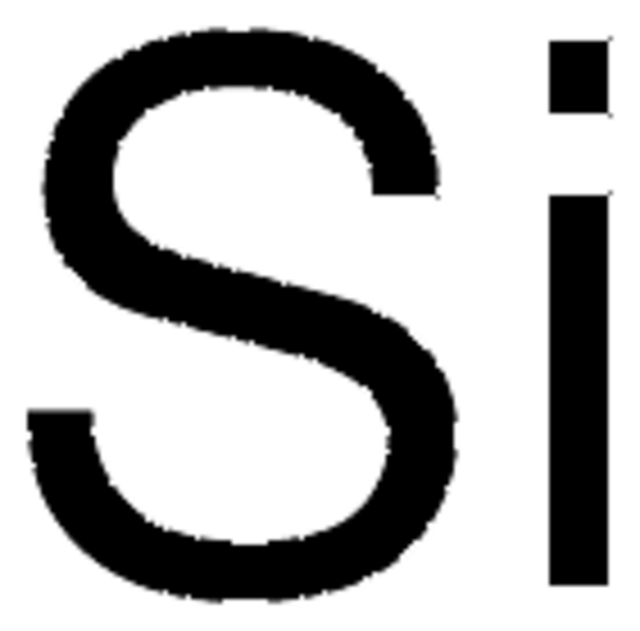215619
Silicon
powder, −325 mesh, 99% trace metals basis
About This Item
Recommended Products
Quality Level
Assay
99% trace metals basis
form
powder
particle size
−325 mesh
bp
2355 °C (lit.)
mp
1410 °C (lit.)
density
2.33 g/mL at 25 °C (lit.)
SMILES string
[Si]
InChI
1S/Si
InChI key
XUIMIQQOPSSXEZ-UHFFFAOYSA-N
Looking for similar products? Visit Product Comparison Guide
General description
Application
It can be used to fabricate Al2O3-C refractories. The silicon powder generates β-Sialon whiskers which imparts high-temperature strength, slag resistance and thermal shock resistance of the refractories.
It can be incorporated into high-densitypolyethylene (HDPE) polymer composites. The addition of silicon powder enhancesthermal stability and thermal conductivity of composites.
Signal Word
Warning
Hazard Statements
Precautionary Statements
Hazard Classifications
Flam. Sol. 2
Storage Class Code
4.1B - Flammable solid hazardous materials
WGK
WGK 3
Flash Point(F)
Not applicable
Flash Point(C)
Not applicable
Personal Protective Equipment
Choose from one of the most recent versions:
Already Own This Product?
Find documentation for the products that you have recently purchased in the Document Library.
Customers Also Viewed
Articles
Technologies are an integral part of our lives and we rely on them for such things as communication, heating and cooling, transportation, and construction. Improvements to technologies have made what they do for us more precise, automated, efficient, and powerful.
Recent demand for electric and hybrid vehicles, coupled with a reduction in prices, has caused lithium-ion batteries (LIBs) to become an increasingly popular form of rechargeable battery technology.
The price of tellurium, a key component in many thermoelectric materials, has risen in recent years, leading to the search for more cost-effective substitutes. This article presents silicide materials as a cheaper potential alternative.
Discover more about advancements being made to improve energy density of lithium ion battery materials.
Our team of scientists has experience in all areas of research including Life Science, Material Science, Chemical Synthesis, Chromatography, Analytical and many others.
Contact Technical Service





